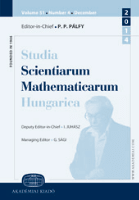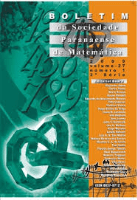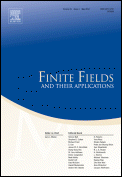
Notes on Number Theory and Discrete Mathematics
metrics 2024
Pioneering Research in Mathematical Innovation
Introduction
Notes on Number Theory and Discrete Mathematics is a distinguished journal published by the BULGARIAN ACADEMY OF SCIENCE, dedicated to advancing research in the fields of number theory and discrete mathematics. Renowned for its scholarly contributions, this journal serves as a platform for researchers, professionals, and students to disseminate their findings and engage in critical discourse. The journal’s ISSN is 1310-5132 and its E-ISSN is 2367-8275, enhancing its visibility and accessibility in the academic community. While it currently operates under traditional access constraints, the journal is committed to fostering an open exchange of ideas and methodologies that drive innovation in mathematical research. By focusing on theoretical developments and applications, Notes on Number Theory and Discrete Mathematics plays a pivotal role in the ongoing exploration of mathematical principles, appealing to a broad audience and helping to shape the future of the discipline.
Metrics 2024
 -
- 0.40
0.40 0.30
0.30 -
-Metrics History
Rank 2024
IF (Web Of Science)
JCI (Web Of Science)
Quartile History
Similar Journals

STUDIA SCIENTIARUM MATHEMATICARUM HUNGARICA
Pioneering Insights for Tomorrow's MathematiciansSTUDIA SCIENTIARUM MATHEMATICARUM HUNGARICA is a distinguished journal published by AKADEMIAI KIADO ZRT, focusing on the vast field of mathematics, specifically categorized under general mathematics. With its ISSN 0081-6906 and E-ISSN 1588-2896, this journal has been a critical platform for mathematicians, researchers, and educators since its inception in 1996, continuously evolving through to 2024. Based in Hungary, it holds an impact factor that positions it in the 3rd quartile for mathematics in the 2023 rankings, reflecting its contribution to academic discourse within the discipline. Though not an open-access journal, STUDIA SCIENTIARUM MATHEMATICARUM HUNGARICA serves as an important repository of innovative research findings and methodologies, making it a vital resource for professionals and students striving to stay ahead in the rapidly advancing world of mathematics. The journal's commitment to quality and rigor enhances its relevance, evidenced by its Scopus rank in the 51st percentile overall in the general mathematics category.

Boletim Sociedade Paranaense de Matematica
Championing Open Access in Mathematical ResearchBoletim Sociedade Paranaense de Matematica is a distinguished journal within the field of Mathematics, published by the Sociedade Paranaense de Matemática in Brazil. With an ISSN of 0037-8712 and an E-ISSN of 2175-1188, this journal has been committed to fostering open access to mathematical research since 2002, ensuring that cutting-edge research is readily available to the academic community. Operating within the diverse landscape of mathematical studies and ranked Q3 for 2023 in the category of Mathematics (Miscellaneous), the journal serves as a platform for innovative contributions and discussions. It ranks 192nd out of 399 in the Scopus database for General Mathematics, reflecting its steady involvement in the global academic dialogue. The Boletim resides at JD AMERICAS, CAIXA POSTAL 19081, CURITIBA PR 81531-990, Brazil, and aims to connect researchers, practitioners, and students by promoting high-quality research and dissemination of mathematical knowledge. By bridging diverse mathematical theories and applications, the journal not only enhances understanding of the discipline but also drives future research directions.

FINITE FIELDS AND THEIR APPLICATIONS
Empowering Research in Algebra and Its Diverse Applications.FINITE FIELDS AND THEIR APPLICATIONS is a premier academic journal published by Academic Press Inc. Elsevier Science that focuses on the interdisciplinary study of finite fields and their diverse applications across various domains of mathematics and engineering. With an ISSN of 1071-5797 and an E-ISSN of 1090-2465, this journal has established itself as a leading platform for researchers, professionals, and students aiming to explore advancements in Algebra and Number Theory, Applied Mathematics, and Engineering. Awarded a Q1 ranking in multiple categories by Scopus in 2023, this journal features rigorous peer-reviewed articles that contribute to both theoretical developments and practical applications, reflecting its relevance within the mathematical sciences community. The journal's convergence over the years from 1995 to 2024 highlights its sustained commitment to quality research, making it an invaluable resource for those seeking to deepen their understanding of finite fields and their significance in contemporary mathematical discourse.

CANADIAN JOURNAL OF MATHEMATICS-JOURNAL CANADIEN DE MATHEMATIQUES
Advancing mathematical excellence, one article at a time.Canadian Journal of Mathematics - Journal Canadien de Mathématiques is a prestigious peer-reviewed journal published by Cambridge University Press, which aims to advance the field of mathematics through the dissemination of high-quality research articles. With its ISSN 0008-414X and E-ISSN 1496-4279, the journal plays a pivotal role in fostering mathematical research and collaboration. It has been recognized for its impactful contributions, currently holding a category quartile ranking of Q2 in Mathematics (miscellaneous) for 2023 and sits in the 66th percentile among its peers according to Scopus rankings. As the journal continues its convergence from its inception in 1994 through to 2024, it remains a vital resource for researchers, professionals, and students seeking to stay at the forefront of mathematical developments. The journal does not operate under an open access model, allowing for a curated collection of articles that adhere to rigorous academic standards.

FIBONACCI QUARTERLY
Diving Deep into Mathematical ApplicationsFibonacci Quarterly is a notable journal published by the Fibonacci Association, focusing on the captivating realms of mathematics and its applications, particularly Algebra and Number Theory. With its ISSN 0015-0517, the journal serves as a vital platform for the dissemination of original research and innovative ideas within its field. Established in the United States and operating since its inception, the journal covers an extensive timeline of contributions from 1996 to 2008 and continues its journey of academic excellence with ongoing publications through 2024. Currently ranked in the Q3 category for Mathematics (Algebra and Number Theory) as of 2023, Fibonacci Quarterly has established itself as an essential resource for researchers and practitioners alike, despite its modest Scopus rank of #91 out of 119 with a 23rd percentile ranking. Although not an open-access journal, it provides crucial insights and advancements that fuel scholarly discussions and foster academic growth in the mathematical community. Whether you are a researcher, a professional, or a student, Fibonacci Quarterly offers a wealth of knowledge that enriches the understanding of number theory and algebra, making it an indispensable resource in the pursuit of mathematical clarity and innovation.

Acta Mathematica Universitatis Comenianae
Connecting scholars through groundbreaking mathematical research.Acta Mathematica Universitatis Comenianae is a distinguished journal dedicated to advancing the field of mathematics, particularly in its miscellaneous branches. Published by Comenius University in Slovakia, this journal provides a vital platform for researchers and scholars to disseminate their findings and engage with contemporary mathematical discourse. Despite being categorized in the fourth quartile for 2023 in general mathematics within Scopus, the journal plays an essential role in fostering academic dialogue and contributing to regional developments in mathematical research. The journal's scope includes a wide array of topics, ensuring contributions from various domains of mathematics are encouraged. With its commitment to publishing quality research, Acta Mathematica Universitatis Comenianae is an invaluable resource for professionals, students, and academics seeking to expand their knowledge and engage with a community of its peers.

Research in Number Theory
Illuminating the path to understanding complex numerical concepts.Research in Number Theory is a prestigious journal eagerly embraced by the mathematical community, focusing on the intricate and profound aspects of algebra and number theory. Published by Springer International Publishing AG, the journal showcases cutting-edge research from 2015 to 2024, making it a pivotal platform for advancing knowledge in its field. With its ISSN 2522-0160 and E-ISSN 2363-9555, this journal holds a commendable position in the academic ecosystem, as evidenced by its ranking in the Q2 quartile for the category of Algebra and Number Theory in 2023. Despite being positioned within a competitive percentile, this journal aims to foster innovation and discovery, providing researchers, professionals, and students with valuable insights into the ever-evolving landscape of number theory. While the journal currently operates under a traditional publishing model, it is committed to disseminating high-quality, impactful research that propels the discipline forward. Join the conversation and contribute your work to a publication that is at the forefront of mathematical discovery.

Miskolc Mathematical Notes
Connecting Researchers Through Groundbreaking Mathematical InsightsMiskolc Mathematical Notes is a distinguished journal in the field of mathematics, published by the University of Miskolc Institute of Mathematics in Hungary. With a commitment to advancing research in areas such as Algebra and Number Theory, Analysis, Control and Optimization, Discrete Mathematics and Combinatorics, and Numerical Analysis, this journal provides a platform for both theoretical and applied contributions that enhance the understanding of complex mathematical concepts. Established in 2010, the journal has steadily gained a reputation, reflected in its 2023 categorization as a Q3 journal across several mathematical disciplines. While it operates under a traditional access model, researchers and mathematicians will find invaluable insights in its peer-reviewed articles. With Scopus rankings demonstrating respectable performance in various mathematical categories, Miskolc Mathematical Notes serves as an essential resource for scholars aiming to stay at the forefront of mathematical research and its applications.

Discrete Mathematics Letters
Connecting ideas in Discrete Mathematics and beyond.Discrete Mathematics Letters is a prominent open-access journal dedicated to advancing the field of Discrete Mathematics and Combinatorics, published by Shahin Digital Publisher. Since its inception in 2019, this journal has rapidly established its presence in the academic community, securing a respectable Q2 category ranking in the 2023 Scopus database, positioning itself at rank #45 out of 92 in its field, making it a valuable resource for researchers and practitioners alike. With a commitment to disseminating high-quality research, Discrete Mathematics Letters provides an accessible medium for sharing innovative ideas and findings within the mathematical sciences, ensuring that researchers, students, and professionals stay informed about the latest developments. As an open-access journal, it provides free access to publications, fostering collaboration and knowledge exchange among the global research community.

Armenian Journal of Mathematics
Cultivating Knowledge in the Heart of MathematicsArmenian Journal of Mathematics is a premier open-access publication dedicated to the dissemination of research in the field of mathematics. Published by the National Academy of Sciences of the Republic of Armenia, this journal has been a significant platform since its inception, freely accessible to readers since 2008. It aims to foster scholarly communication by providing a forum for innovative research, particularly in general mathematics and its miscellaneous applications. As of 2023, the journal is ranked in the fourth quartile of mathematics journals according to Scopus metrics, reflecting its growing presence in the academic community. Although the H-index and specific scope details are currently unavailable, the journal's commitment to promoting high-quality mathematic discourse supports the development of the mathematical sciences within Armenia and beyond. We invite researchers, professionals, and students to explore the Armenian Journal of Mathematics for valuable insights and contributions that advance the understanding of mathematical theories and applications.